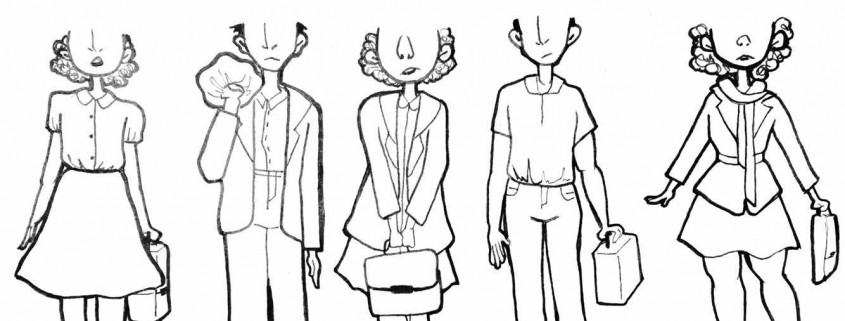COLUMN: Allegiance reminds audiences of Japanese internment
 I am not of Japanese descent, nor do I have any personal ties to anyone incarcerated in the Japanese American internment camps during World War II. However, it would be a lie to count myself as disassociated with this horror when the concepts of alienation and racism are not foreign to me; when politics guided by fear once again grip our country; and when the 75th anniversary of Executive Order 9066 retreated so silently into our past.
I am not of Japanese descent, nor do I have any personal ties to anyone incarcerated in the Japanese American internment camps during World War II. However, it would be a lie to count myself as disassociated with this horror when the concepts of alienation and racism are not foreign to me; when politics guided by fear once again grip our country; and when the 75th anniversary of Executive Order 9066 retreated so silently into our past.
If I told you that last Sunday marked the 75th anniversary of President Franklin D. Roosevelt’s signing of an order to incarcerate 120,000 Japanese Americans, would you be surprised? Probably. But that’s not your fault — I don’t remember seeing more than a few articles posted on social media or a Twitter hashtag buried under at least seven others trending. For anyone or anything else — a person, a marriage, a death — 75 is a landmark year, but apparently not so much for Japanese American internment.
How is history supposed to be accessible when those who remember it feel so inclined to forget and distance past crimes? The headlines I encountered even labeled the events “Japanese internment,” as if those forced out of their homes were not everyday Americans who farmed and made lives on Western soil.
But this fate of silently fading into history is not tolerated by Allegiance, a Broadway musical about internment by actor George Takei. I was lucky enough to attend a screened version of the performance at L.A. Live last Sunday in a crowd of young and old Japanese Americans. Fierce and pointed and heartbreaking, what the musical lacks in artistic subtlety it makes up for in brazen spirit — a fist thrust in the air proclaiming that the horrifying practice of internment and alienation will not be forgotten.
Allegiance is, unshockingly, a musical about loyalty — but it’s not the same kind Roosevelt thought he was enforcing when he signed Executive Order 9066. No, there’s no need to test a person’s allegiance to the United States when they have always been American. Instead, the musical asks: Where do you turn to when your own country dismantles its allegiance to you? And what happens to your family when everyone turns in different ways? What happens to you?
Sammy (Telly Leung) and Kei (Lea Salonga) are siblings whose lives are torn apart when they, their father and their grandfather (George Takei) are sent to Wyoming’s Heart Mountain camp to live out the remainder of the war. At Heart Mountain, the family encounters heartbreak and are drawn out to their rawest, angriest selves, but they also discover perseverance and hope.
Kei finds love in a rebel named Frankie (Michael K. Lee) and Sammy finds love in a white nurse, Hannah (Katie Rose Clark). Yet, 50 years later when the musical begins, Sammy (now played by George Takei) is an old man living alone, receiving word that Kei passed away after half a century without contact from her brother.
How did he get here?
The musical, which closes out at a relatively short two hours, hits its emotional beats at a rhythm almost too fast and too easily. The songs are soaring but they don’t grab your heart; the performances and vocals are rich and heartfelt but feel almost too grand for the musical’s small frame. Overall, Allegiance is a contained story with a sprawling agenda — and sometimes the musical takes shortcuts that don’t feel real.
And yet, I am a firm believer that works should be judged twofold — first by their artistic merit and then by the way they shape the conversations around them. Perhaps no piece of modern theater tests this more than Allegiance, which is not only artistically imperfect but also very necessary.
The musical may be too obvious, too loud, too unsubtle in emotional depth. But how else, then, can someone tell a story about Japanese American internment? How else do you make people talk and remember if you’re not shouting into their faces?
Allegiance was a quilt woven of many threads, but one of the strongest themes dealt with shame: the idea that if hope can move mountains, then shame can keep those mountains in place. There is Americans’ modern shame about Japanese American internment, but one that is also nothing compared to the hurt and grief embedded within communities told, 75 years ago and today, that they are not of this country, that they do not belong, that their identity is erasable and -— moreover — not their own. Sammy took that shame and fought for his country until he earned the Purple Heart, left his family, didn’t talk about the internment camps and what happened there for 50 years.
If you have not stood in shoes like that, how are you to gauge the horrors by which crimes like Executive Order 9066 continue to this day? How are you to know what it’s like to come to this country for the freedom and safety it holds out, to invest in the American promise only to be told that the promise is not for you? Because of the color of your skin. Because of where you and your ancestors are from. Because of the God to whom you pray.
You can’t. You must believe. You must listen to these stories and believe them. Because empathy is a force more powerful than hate, one that is forged only when we listen, and one that will not withstand the test of time. Forcing the gap between two people doesn’t make a person stronger — between Sammy and Kei, sometimes it comes too late. Forgetting the past only makes the past come back once more.
Zoe Cheng is a sophomore majoring in writing for screen and television. Her column, “Wide Shot,” runs Wednesdays.

